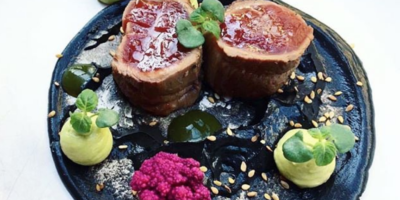How Parisian Women Eat to Stay Slim
The topic of this article has been explored by many before me. So much so that it has, in fact, become something of a cultural cliché. But rather than revisiting old territory, let’s look at what I observe amongst my friends and entourage in 2018.
In my opinion certain Parisian women eat and stay slim thanks to the cultural norms, traditions surrounding mealtimes in France, as well as certain common truths in the daily lives of young professional women in Paris.
If you’re interested about finding out a little more yourself about French food, delicacies and eating habits it’s here to meet a real life French foodie!
Number one: a diet which is high in fat and protein
I think we can unanimously agree on the fact that French food isn’t especially light, or traditionally vegan-friendly compared with Japanese cuisine, for example. From time to time I struggle with a carnivorous carte as a pescatarian and acknowledge that things would be twice as hard if I didn’t eat fish and cheese.
Despite the traditional make up being high in fat and animal products food in France is often bought directly from the specialised artisans and shops: Bread from the boulangerie, meat and charcuterie from the boucherie and cheese from the fromagerie.
Don’t even get me started on the difference in taste of the incredible seasonal fruit and vegetables, available cheaply from various markets. My favourites are the marché d’Aligre and the marché de Bastille.
All this means that the food has been refined very little when it arrives on your plate and whilst high in certain fats, it is generally much healthier in terms of additives and conserves than anything you’d find in a supermarket which would likely be much more heavily processed.
Because the food is rich, it’s pretty hard to eat too much at any one sitting. Pure protein fills you up pretty fast, whereas with lighter processed food you could probably keep snacking without feeling full or satisfied.
This logic basically follows along the same lines as the Atkins diet, popular in the 90s. It is not famed for being healthy if not practiced with moderation, mixing in leafy greens fibre and fruit. That said, don’t let me ruin the fun of your planche mixte with a glass of pinot blanc.
Number two : portion sizes
Photo by Louis Hansel on Unsplash
In general portion sizes in Paris are not outlandishly generous. There is enough to eat, (unless you go for a menu de dégustation, then due to the number of courses they really will only give you a taste of each concoction). But few Parisians are in the habit of eating excessively.
Occasionally when I go out with girlfriends one of them will ask how big a certain plat or entrée is before ordering it. This especially applies to lunches after our morning runs:“Les portions sont-elles généreuses?” or “Est-ce que c’est bien consistant?” being favourite queries, attempting to size up just how generous a portion you’ll be getting.
Number 3 : Mealtimes in France are different

It’s important to appreciate that strict mealtimes are observed in France. You’ll be breaking culturally coded behaviour if you do not observe them during your visit, but concessions are made for tourists with “service continu” meaning the kitchen stays open outside of regular hours.
These restaurants will serve you lunch at 2.30pm when you finally make it out of the Louvre, or let a family with little ones eat their dinner at 5pm sharp.
For the rest of Paris, breakfast takes place at the comptoir of a brasserie around the corner from your office between 8 and 9.15. Lunch is often referred to as “la pause midi”, but I’ve never seen anyone sitting down to tuck at 12 sharp. I think of it more like the time that workers take note to finish off those last few tasks, grab their coat, tickets-restaurant (meal coupons provided by employers) and head out the door to their lunch spot. Goûter, a sweet afternoon snack accompanied by a hot drink, is the reserve of children, parents and freelancers or those on télétravail, (working from home). My favourite mealtime tradition Apéro, a glass of wine with a few olives or nuts to pick at, is at seven or half past, sitting down to dîner at eight.
Why do mealtimes matter?
Various scientific studies have shown that our bodies respond well to routine and discipline. If mealtimes just sort of ‘happen’, with a lot of grazing and snacking thrown in to boot, we’re much more likely to go overboard and end up unconsciously eating more than we should.
Number four : quality over quantity
This follows along the same lines. I’ve noticed that many of my French girlfriends would rather skip a meal (usually lunch) if there is nothing on offer that takes their fancy. This tends to happen when we’re not in a spot that they’ve chosen. Examples I can think off the cuff tend to be road trips to Normandy and regions outside Paris .
Faced with the choice between a sad sandwich, judged not up to standard, and bypassing it all together for a café ou chocolat chaud, one of the later will usually win out. I think the jury’s out on whether skipping meals will result in weight loss and whether it’s especially healthy or not, but there are my observations.
Number five : le coupe faim
Photo by Rubén Bagüés on Unsplash
Le coupe faim, which literally ‘cuts your hunger’, a better translation perhaps being ‘appetite suppressant’, certainly plays its part in the way French women eat to stay slim.
After all, how much you eat is very likely dependant on your appetite. Why women in Paris would have a smaller appetite than women elsewhere in France can be difficult to understand, until you start consider daily Parisian lifestyle. A lot of Parisian life takes place outside, due to small apartment sizes. Thanks to the (relatively) reasonable prices in brasseries parisiennes (roughly 1€ for a short coffee or 3€ glass of wine), men and women pull up a one of the famous rattan chairs and settle down en terrasse to enjoy a drink accompanied by a book, cigarette or a little people watching.
Perhaps this act of slowing down, taking one’s time and indulging in a small vice which isn’t food based, actually leads to less consumption later on, once à table.
Number six : Paris is a stressful city

In the last 18 months of eavesdropping on Parisienne colleagues unpacking their days together in the métro or over lunch, I have overheard the phrase burn-out, pronounced “b’huuurn oùùùt” many times. Stress, specifically stress at work, is so commonplace that it has become the norm. Reaching fever point, only then does it get discussed, leading to a recent epidemic of the previously mentioned phrase.
Living in the capital presents its joys and challenges. There is definitely a buzz and bustle, which many Parisians and visitors adore. The beauty of the city is world-renowned. The cultural offer and commercial dynamism is unmatched elsewhere in France. Yet on the flipside, competition for jobs is fierce, rent and council tax (taxe d’habitation) are notoriously high, divorce rates are also rumoured to be higher in the capital. So all in all there is plenty to loose your appetite over within city living. Stress burns calories.
Number seven: other people’s standards

Here’s one I’m going to be a little careful on and preface by emphasising that these are simply my experiences. Everyone will perceive and have slightly different ones.
A few years ago I went for a routine check up with a généraliste, a general practitioner or doctor. Alongside other routine checks he asked me to step on the scales. 60 kilos, “let’s call it 59”, he said with a complicit paternalist air and a kind wink. At the time, I don’t remember feeling offended. This 60 something, slightly bourgeois Frenchman harked from a generation where the Parisian women in his cabinet only topped 60 kilos stepping on la balance if they were fat, or pregnant with twins.
It’s worth a mention that at 173cm tall I was in the bottom quarter of a healthy BMI, and had monsieur shaved another four kilos off, I would have been clinically underweight. Perhaps he saw that as the norm having practiced medicine in the 80’s when 8.5% of the French female population was underweight, potentially more in Paris.
And if you think it’s just me getting this feedback, that’s wishful thinking. My local lady friends are on the receiving end of much the same. Walking down la Rué Saint Honoré chatting away, a hilariously bright ex-lawyer told me the story of trying to shop in one of the high-end boutiques there. Pretty women style the sales attendants were actively mean to her and told her that their clothes were meant for someone less corpulente.
One would hope that this pressure on Parisian women to stay incredibly slim would have become as outdated as the generation who upheld these standards. Sadly a close girlfriend’s very recent experiences on Paris Tinder prove this not to be the case.
On an evening out with her date, (a guy who she’d been seeing for just shy of two months), her beau took it upon himself to announce towards the end of their elegant dinner, that the real reason he couldn’t commit to her was that he was attracted to “les filles plutôt fines,” rather slimmer women. Shock at his lack of manners was replaced by outrage and surreal humour as he then went on to comfort her for the comment that he had just made.
It seems unfathomable that anyone would lack the social grace to understand that this is never something to be uttered on a date. To put it in context this friend of mine is above averagely pretty, she is also educated to PHD level and happily has the intellectual discrimination, as well as confidence required not to rise to shocking personal criticism of her healthy weight.
Luckily this attitude is on the wane. A quintessential parisienne ad exec told me that in her advanced amateur dance troupe many of the younger women in their early twenties were far from thin, but didn’t seem to care and were really comfortable with their bodies and movement. Hurrah! Youpi!
Number eight : La révolution sportive is happening in Paris
Over the last ten years, the arrival of plenty of low cost gyms, as well the growing popularity of yoga have changed attitudes to sport in the capital. Now over half the Parisian women I know have a dance or yoga class, boxing has taken off too.
Whilst running lacked popularity a few years back when I first arrived in Paris, now there are groups dedicated to neighborhood runs sponsored by Nike or Adidas.
There are even several competitive courses over the year than friends and colleagues sign up for together, my favourites being, The Colour run, La Parisienne (aptly named for this article) and the Nike 10K.
If you fancy a footing, the French expression for going for a jog, while in town, or even a cycle through the manicured Versailles gardens – go ahead, I can promise you won’t be disappointed.
Number nine : French women are probably lucky!

Now, nobody’s going to appreciate me saying this because it just boils down to the unfair fact that it’s you and your luck. Certain female friends and acquaintances have a naturally very slim build. They don’t seem to do anything special, certainly no strict diets or sport regimes.
I think I hear stories about recipes, or even surprisingly random pastimes such as Jeux de roles (a fantasy role-play game), more often than anyone mentions their gym membership to me. A sultry, svelte parisienne party girl joined me for “Cardio Ballet barre” led by one of my favourite dance and yoga teachers, Meghan.
Due to her enviable figure, I had always sort of assumed that she must do something to keep in shape. A full 35 minutes into the class, following the warm up and cardio my slender non sportive pal started struggling to catch her breath and telling me she felt really out of sorts. This resulted in a minor malaise and the very sweet reception staff at studios bleus scurrying over with glasses of water. I have never made the same mistake again of correlating a Paris born copine’s lack of body fat with any type of sporting endurance.
So there you have it! How Parisian women eat to stay slim: A high fat diet of high quality farm-fresh produce, petite portion sizes, strictly observed mealtimes, a discerning palate, appetite suppressing habits, city stress, other people’s standards, some sport and lucky genes.
None of these reasons are especially glamorous, rather a few day-to-day observations that could just hold the truths behind a much hyped myth.
But hopefully healthy habits and body positivity will prevail in the French capital, balancing the best of an agricultural country’s exceptional fresh produce with the new generation’s changing habits.
On your trip in Paris, make sure you talk to locals about their relationship with food; it’s certainly a central one. And these exchanges might just enrich your stay and help you draw your own conclusions about some of the ideas I’ve shared.
Allez, tout le monde à table – Bon appétit!
Planning a trip to Paris ? Get ready !
These are Amazon’s best-selling travel products that you may need for coming to Paris.
Bookstore
- The best travel book : Rick Steves – Paris 2023 – Learn more here
- Fodor’s Paris 2024 – Learn more here
Travel Gear
- Venture Pal Lightweight Backpack – Learn more here
- Samsonite Winfield 2 28″ Luggage – Learn more here
- Swig Savvy’s Stainless Steel Insulated Water Bottle – Learn more here
Check Amazon’s best-seller list for the most popular travel accessories. We sometimes read this list just to find out what new travel products people are buying.
















